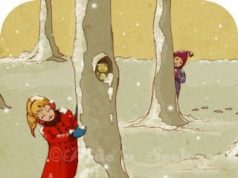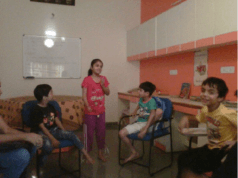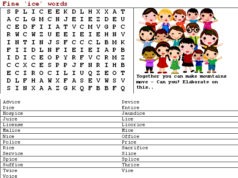Bears have excellent sense of smell and very keen hearing. However, they are short sighted.
Mishook, the cub Bear, smelt something sweet. What could it be? The cub did not know but his mother and the elder ones recognized the aroma of honey. With hurried steps, the whole Bear family set off in search of the honey.
They trotted for about a kilometre before they reached the old decayed tree trunk where the bees had dwelt. The poor bees saw the plunderers and shook in alarm. They, then defended their store of honey by fiercely stinging the Bears.
The mother Bear and the cubs calmly continued their feast of honey, their thick fur protecting them against the attacks of the bees. They looked nowhere. One angry bee, however, plunged its sting into Mishook’s nose. He growled furiously, shook his head, jumped, snorted, turned around like a spinning top and with great difficulty, he managed to beat off the
troublesome bee with his paws. But this happening did not shake him and he had his taste of honey which he became very fond of.
Answer the Questions:
1. Bears have two great sense. Which are they?
2. Which odour blew towards Mishook?
3. Where did the Bees dwell?
4. When the Bears came, what did the Bees do?
5. Why were the Bears able to continue their feast of honey?
6. Which bear was stung by an angry bee?
7. How did Mishook get rid of the Bee?
Using Longer words:
The word where can be joined to any, every, no and some.
any + where = anywhere
every + where = everywhere
no + where = nowhere
some + where = somewhere
The word nobody can be joined to any, every, no and some
any + body = anybody
every + body = everybody
no + body = nobody
some + body = somebody
The word ever can be joined to when, where, who, what, how and which
whenever
wherever
whoever
whatever
however
whichever
A – Use longer words to fill each space:
1. The hammer must be _______ in the house
2. We looked ______ the lost hammer.
3. The hammer was ______ to be seen.
4. We could not find the hammer _______.
B – Write words which fill the gap:
1. I don’t think there is ______ at home.
2. We should be kind to _____.
3. You must get _____ to help you in the garden.
4. Jill knocked at the door but _____ answered.
C – Write the -ever words which will finish these sentences:
1. He never wears a hat ______ cold the whether is.
2. People must buy grocery _____ it costs.
3. ______ took the money must give it back.
4. You can visit us ______ you like.
Using ate and eaten :
1.Mishook ate his honey. (ate needs no helping word)
1 a. Mishook has eaten his honey. (has helps the word eaten)
1 b. The honey was eaten by Mishook. (was helps the word eaten)
The word eaten always has a helping word:
has eaten
have eaten
is eaten
are eaten
was eaten
were eaten
had eaten
Use ate and eaten.
1. I _____.
2. You have ______.
3. It was _________.
4. He _______.
5. You _______.
6. He has _________.
7. We ________.
8. They are __________.
9. We had _________.
More sentences using ate and eaten
1. Bins _ his supper and went to bed.
2. After Bins had ______ his supper, he went to bed.
3. Many means are _____ on the beach during summer.
4. The dog ____ all the biscuits the children gave him.
5. The little bear’s porridge was ________ by Goldilocks.
6. Bread is _______ all over the world.
7. The fruits ______ by the children.
©Swagat Children Library, www.kidsfreesouls.com – Grammar Through Stories by ilaxi patel, Ahmedabad.INDIA







